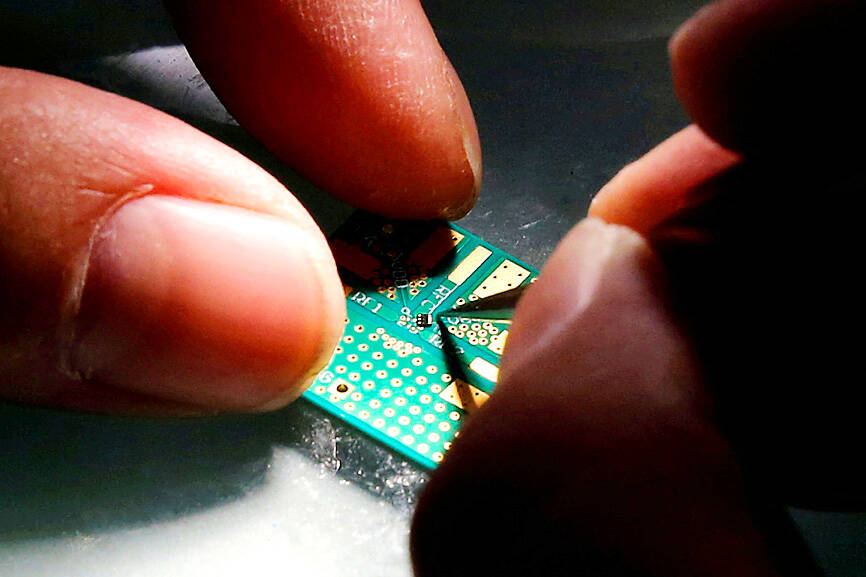China is working on a more than 1 trillion yuan (US$143 billion) support package for its semiconductor industry, three sources said, in a major step toward self-sufficiency in chips and to counter US moves aimed at slowing its technological advances.
Beijing plans to roll out what would be one of its biggest fiscal incentive packages over five years, mainly as subsidies and tax credits to bolster semiconductor production and research activities at home, the sources said.
The plan could be implemented as soon as the first quarter of next year, said two of the sources who declined to be named as they were not authorized to speak to media.

Photo: Reuters
The majority of the financial assistance would be used to subsidize the purchases of domestic semiconductor equipment by Chinese firms, mainly semiconductor fabs, they said.
Such firms would be entitled to a 20 percent subsidy on the cost of purchases, the three sources said.
The fiscal support plan comes after the US Department of Commerce in October passed a sweeping set of regulations, which could bar research labs and commercial data centers’ access to advanced artificial-intelligence chips, among other curbs.
US President Joe Biden in August also signed a landmark bill to provide US$52.7 billion in grants for US semiconductor production and research, as well as tax credit for chip plants estimated to be worth US$24 billion.
With the incentive package, Beijing aims to step up support for Chinese chips firms to build, expand or modernise domestic facilities for fabrication, assembly, packaging, and research and development, the sources said.
Beijing’s latest plan also includes preferential tax policies for the nation’s semiconductor industry, they said.
China’s State Council Information Office did not immediately respond to a request for comment.
The beneficiaries would be both state-owned and private enterprises in the industry, notably large semiconductor equipment firms such as NAURA Technology Group, Advanced Micro-Fabrication Equipment Inc China and Kingsemi, the sources added.
Achieving self-reliance in technology featured prominently in Chinese President Xi Jinping’s (習近平) full work report at the Chinese Communist Party congress in October. The term “technology” was referred to 40 times, up from 17 times in the report from the 2017 congress.
Xi’s call for China to “win the battle” in core technologies could signal an overhaul in Beijing’s approach to advancing its tech industry, with more state-led spending and intervention to counter US pressures, analysts have said.
See JAPAN on page 10

DEFENDING DEMOCRACY: Taiwan shares the same values as those that fought in WWII, and nations must unite to halt the expansion of a new authoritarian bloc, Lai said The government yesterday held a commemoration ceremony for Victory in Europe (V-E) Day, joining the rest of the world for the first time to mark the anniversary of the end of World War II in Europe. Taiwan honoring V-E Day signifies “our growing connections with the international community,” President William Lai (賴清德) said at a reception in Taipei on the 80th anniversary of V-E Day. One of the major lessons of World War II is that “authoritarianism and aggression lead only to slaughter, tragedy and greater inequality,” Lai said. Even more importantly, the war also taught people that “those who cherish peace cannot

STEADFAST FRIEND: The bills encourage increased Taiwan-US engagement and address China’s distortion of UN Resolution 2758 to isolate Taiwan internationally The Presidential Office yesterday thanked the US House of Representatives for unanimously passing two Taiwan-related bills highlighting its solid support for Taiwan’s democracy and global participation, and for deepening bilateral relations. One of the bills, the Taiwan Assurance Implementation Act, requires the US Department of State to periodically review its guidelines for engagement with Taiwan, and report to the US Congress on the guidelines and plans to lift self-imposed limitations on US-Taiwan engagement. The other bill is the Taiwan International Solidarity Act, which clarifies that UN Resolution 2758 does not address the issue of the representation of Taiwan or its people in

US Indo-Pacific Commander Admiral Samuel Paparo on Friday expressed concern over the rate at which China is diversifying its military exercises, the Financial Times (FT) reported on Saturday. “The rates of change on the depth and breadth of their exercises is the one non-linear effect that I’ve seen in the last year that wakes me up at night or keeps me up at night,” Paparo was quoted by FT as saying while attending the annual Sedona Forum at the McCain Institute in Arizona. Paparo also expressed concern over the speed with which China was expanding its military. While the US

‘FALLACY’: Xi’s assertions that Taiwan was given to the PRC after WWII confused right and wrong, and were contrary to the facts, the Ministry of Foreign Affairs said The Ministry of Foreign Affairs yesterday called Chinese President Xi Jinping’s (習近平) claim that China historically has sovereignty over Taiwan “deceptive” and “contrary to the facts.” In an article published on Wednesday in the Russian state-run Rossiyskaya Gazeta, Xi said that this year not only marks 80 years since the end of World War II and the founding of the UN, but also “Taiwan’s restoration to China.” “A series of instruments with legal effect under international law, including the Cairo Declaration and the Potsdam Declaration have affirmed China’s sovereignty over Taiwan,” Xi wrote. “The historical and legal fact” of these documents, as well